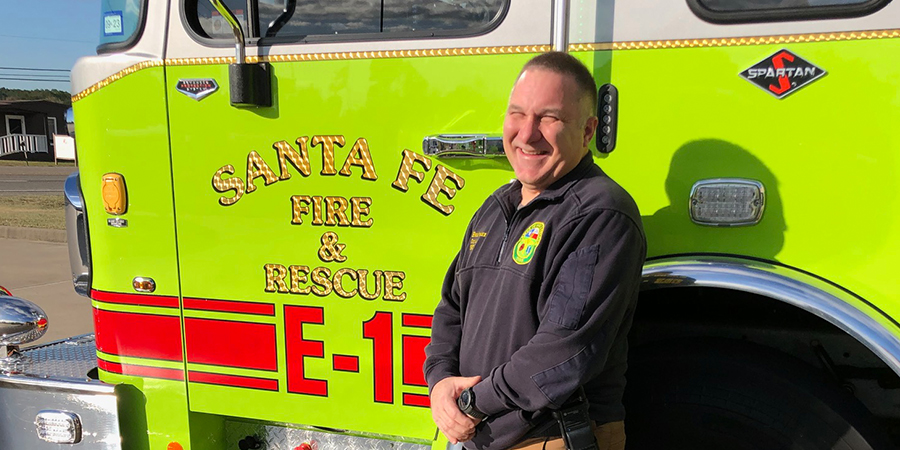One night last November, Santa Fe Fire & Rescue Assistant Chief Vic Boudreaux, 53, thought he had heartburn from tomato sauce he ate, so he took antacids and went to bed.
Boudreaux discovered the next day that he had had a heart attack with a blocked coronary artery—a STEMI— when he went to the UTMB Health League City emergency room.
“EMTs are the worst patients,” Boudreaux said.
When he got home from his full-time job as an operator at a chemical plant, he had a burning sensation in his chest. Boudreaux argued with his wife, who is a registered nurse at a hospice. She wanted him to go to an emergency room. He thought he just needed more heartburn medicine.
Boudreaux also had a headache that night. The next morning, his headache was still there, so he went to the Santa Fe Fire Department to talk to a colleague, a senior paramedic.
The paramedic did three different EKG 12-lead readings.
“The first thing it said was a STEMI, which of course scares the bejesus out of me. My pulse rate went up a heartbeat. My blood pressure went up. Everything went Boudreaux said. “The second reading was different than the first, and then the third one was normal.
“You need to get a blood test,” the paramedic stressed.
“I drove myself over to the urgent care to see if they could do a blood test to make sure that there was nothing there,” he said. “And, of course, it was like they were giving away a free toaster with every blood pressure check or something because the place was packed.”
He checked out the emergency room instead and decided it didn’t look busy.
“Of course, the intake nurse and staff recognized me from working in EMS,” he said. “I had just brought a patient there maybe two or three days earlier.”
“Don’t you usually bring patients in?” a nurse asked him.
The staff ran an EKG on Boudreaux, then did the bloodwork. About 15 minutes later, the ER doctor walked in and handed him a pile of baby aspirins.
“Start chewing,” the doctor said.
“As soon as he said that, I knew it was definitely cardiac,” he said.
The doctor told Boudreaux he had a significant blockage and a cath lab team needed to find the blockage before it got worse.
He told the cath lab team how scared he was of dying. One of the nurses kept telling him, “We got you. We’re here. We’re not going to let that happen.”
“I couldn’t have been in a better place,” Boudreaux said. “It was just that reassuring feeling. They were absolutely outstanding. They’re just very, very helpful in explaining everything that was going on for them.”
Everyone in the cath lab introduced themselves to Boudreaux, something that really impressed him. The team also told him the next time he brought in a patient headed for the cath lab, he could go along and see what it was that the team was about to do to him—put a stent in.
He had 99% blockage in his right coronary artery.
While he was in the hospital, he got a bad headache, maybe the worst one he has ever had in his life.
“It was because of all the different drugs they put me on,” Boudreaux said. “They tell you that in class, but now I’ve actually experienced that. I know we’ve seen that when we give nitro to a patient, and then they say, ‘Oh, my head.’ It gives me a whole new perspective when you’re saying the same words that you’ve heard from a patient. It’s humbling.”
It’s why Boudreaux said he feels more compassion and understanding as an EMT. “It was a life-altering experience to go from not taking any medications and living a pretty decent life to having a heart attack,” he said. “It’s eye-opening.”
He realized he needed to focus more on his health, what he eats and how he moves, he said. Last year, he had COVID and stopped smoking then. He wonders what effect all that smoking has had on his body.
“I need to make sure not just me but all the people under me who work for EMS are taking care of themselves more,” he said.
The heart attack didn’t damage his sense of humor. He knows he was in denial the night he had the heartburn argument with his wife. “The worst thing about it was I had to call my wife and tell her, ‘You were right.’"
